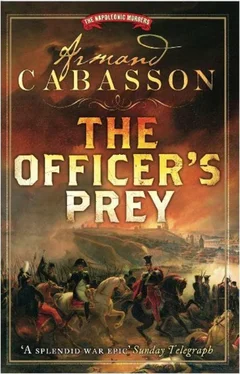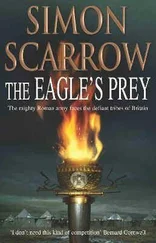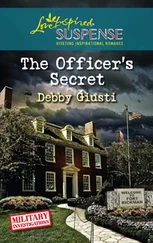THE OFFICER’S PREY
ARMAND CABASSON
Translated from the French by Michael Glencross
For Emmanuelle
with whom I have the joy of sharing my life
and for Françoise
CHAPTER 1
STRANGELY, his hands were not trembling. The man was gazing at the body of the servant to whom he had been talking just a few moments earlier. His victim, now a pitifully bloodied and mutilated corpse, was real enough. But he was staring at her with as little feeling as if she were a broken doll. What made him uneasy was not that he had killed her, but that he felt no guilt. In sharp contrast to his inner turmoil as he’d stabbed the woman again and again, he now felt calm.
He stood up so suddenly that his chair almost toppled over. Time was against him. The innkeeper or one of his employees was bound to knock on the door sooner or later to ask for help serving the customers. The man knew he had to shake off his lethargy. His shoes, trousers, shirt and hair were all covered in blood. He had managed only partially to clean it from his hands and face. Impossible to run the risk of encountering a customer in the corridor. And how could he walk through the main room downstairs without being accosted by one of the infantrymen that were eating, getting drunk, smoking, chatting and leering at the serving girls? When he had entered the bedroom he had not known he was going to kill the woman. Now he realised he was trapped and his only route of escape was through the window.
The bedroom was on the third floor, under the eaves. It had rained the whole evening and heavy cloud still hid the moon. The pitch-dark gave him a reasonable chance of being unnoticed by the many soldiers passing in the street. He opened the window and cautiously looked down. Three infantrymen were staggering along, laughing and bumping into each other. Groups of Italians and Frenchmen were arguing, neither understanding what the other was saying. The French army IV Corps was camped nearby, so the small town and all the neighbouring villages were thronged with soldiers.
Like a hussar committed to the charge, the man decided to go for it. With his bloodstained shirt concealed by an ordinary soldier’s grey greatcoat, he climbed on to the windowsill and hauled himself up on to the overhang of the tiles. From there he reached the top of the roof without difficulty, crawled carefully along to the large stone chimney and hid behind it. Now what? There was nothing he could hold on to in order to climb down. In any case, that was out of the question for the time being. For the moment he stayed hidden in the darkness.
The street seemed to belong to another world; it was bathed in light and full of activity. The inns and private houses with rooms to let to soldiers had put lamps and candles in their windows. A constant stream of soldiers was arriving from outlying areas, lighting their way with torches, which made the countryside look as if it were swarming with fireflies. Most did not have the required passes, but the soldiers that were supposed to escort them back to their dreary camps were instead joining in the revelry.
The man looked at the next roof. There was a narrow street between but he should be able to leap across it. He stood up, negotiated his way round the chimney and flung himself into space. Stumbling against the other chimney, he fell forward, but managed to cling on to the ridge of the roof. A few tiles, dislodged around him, slid halfway down. He recovered himself and began moving again. He was in a hurry, trying not to think about the abyss that had opened up inside him in that bedroom, the chasm he was only just discovering. The roof of the adjoining house was rather less steeply pitched. The minutes were ticking by and he had still managed to advance only a few yards. Taking a risk, he stood up and moved forward, arms spread out, treading hesitantly like a tightrope walker. Fortunately, the ridge of the roof was a tile wide and, quickly learning dexterity, he speeded up. In this way he went past two houses, scrambled on to a raised roof and leapt across a second narrow street to land three feet below on the chimney of an inn.
By now he was almost running. Then an old tile suddenly gave way beneath him. He whirled his arms about, twisting this way and that, his body swaying as if unsure which way to fall, but eventually he regained his balance. The tile, meanwhile, continued its descent and shattered at the feet of a soldier in a grey greatcoat. The man immediately levelled his musket at the rooftops.
‘Stop! Who goes there?’
‘Private Mirambeau, what are you playing at?’ roared a sergeant.
‘A tile nearly hit me on the head, Sergeant. Someone’s walking on the rooftops.’
The sergeant looked up. ‘There’s nobody up there, Mirambeau, just crumbling tiles that—’
The sound of firing cut short the NCO’s words. The soldier’s eyes had adjusted to the darkness and he had just made out the outline of a rapidly disappearing figure.
‘To arms! There’s someone on the rooftops.’
Immediately a crowd gathered around the two men. A corporal, completely drunk, pointed his musket skywards.
‘It’s a Russian spy! Fire away like at Eylau, lads.’
He fired and two infantrymen did likewise. A hot-headed young lieutenant rushed up, sabre in hand.
‘Who’s attacking us?’
‘Private Mirambeau’s seen a Russian spy leaping about on the rooftops, sir.’
‘There are three of them at least,’ someone claimed authoritatively.
Further along the street other soldiers were firing or calling on their comrades to do so.
‘A great big devil of a fellow!’ declared one unsuccessful marksman.
His companion took aim.
‘Devils don’t scare me – take that!’ But his shot failed to halt the moving figure.
‘Surround the buildings!’ the lieutenant shouted excitedly.
The gang of soldiers split into two groups which charged off in opposite directions. Some were laughing their heads off, finding, in their drunken high spirits, this manhunt even better entertainment than a game of cards.
The fugitive kept running and with each step might have fallen to his death. A bullet struck a chimney near him, showering him with fragments of stone. He could hear shouts and cries, and the sound of firing. Someone yelled: ‘The Russians are taking pot shots at us from the rooftops!’ and the street was soon alive with the rumour. One bullet shattered a tile at the fleeing man’s feet, another whistled past his ears while a third broke a windowpane and produced a burst of drunken laughter.
Suddenly he noticed a tree growing against the back of the building. Without hesitating, he ran down the steep slope and flung himself as far forward as possible, arms outstretched. The leap seemed to last an eternity. Then foliage grazed his face. He grabbed a branch but immediately it bent beneath his weight and snapped. His ribs were struck a painful blow by another considerably thicker branch, but he clung on to it, now only a few feet above the ground. He dropped down and landed in a puddle.
He was about to rush off into the shelter of the nearby forest when a voice rang out behind him.
‘Hold it. So where do you think you’re going, old son? You wouldn’t be the cause of all these fireworks, would you?’
The man turned round. A sergeant was pointing his musket at him, the bayonet fixed.
‘Come closer to the light.’
The shouting was getting nearer. The man obeyed.
The sergeant blinked several times, straightened his musket and stood to attention. ‘Beg your pardon, Colonel. I’ve only just recognised you.’
The man lunged forward and stabbed him with his knife, right in the heart.
‘More’s the pity for you …’
*
That 29 June 1812, Captain Margont watched the crossing of the Niemen in fascination. The river marked the border between the Grand Duchy of Warsaw, an ally of France, and Russia. Getting across this obstacle was therefore the first test in this campaign. A few days earlier, Napoleon and the bulk of his troops had crossed the broad stretch of water further to the north via the three bridges built by General Éblé in record time. Margont was serving in IV Corps, made up of forty thousand men under the command of Prince Eugène de Beauharnais, Napoleon’s stepson and Viceroy of Italy. Now it was the turn of this force to enter Russian territory.
Читать дальше












